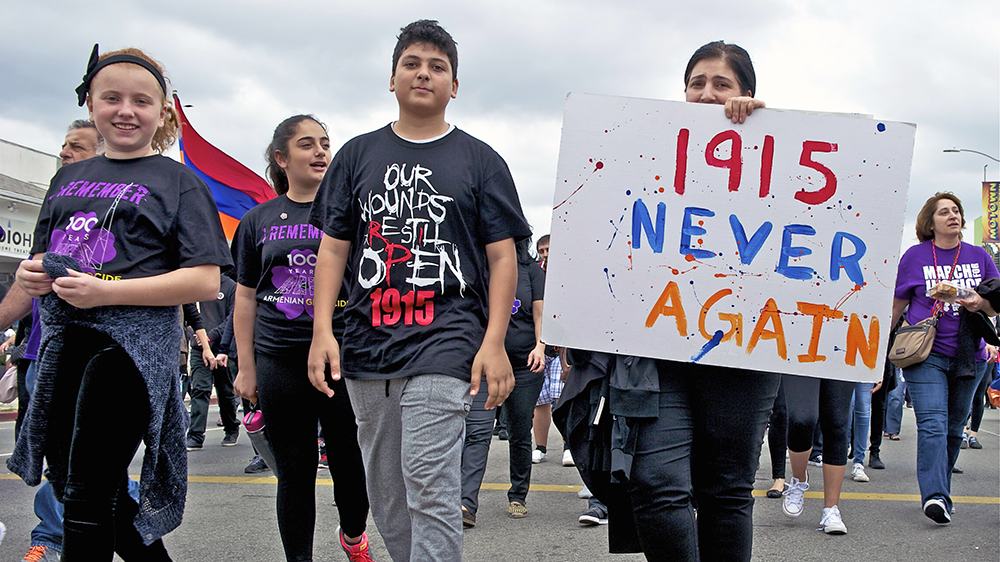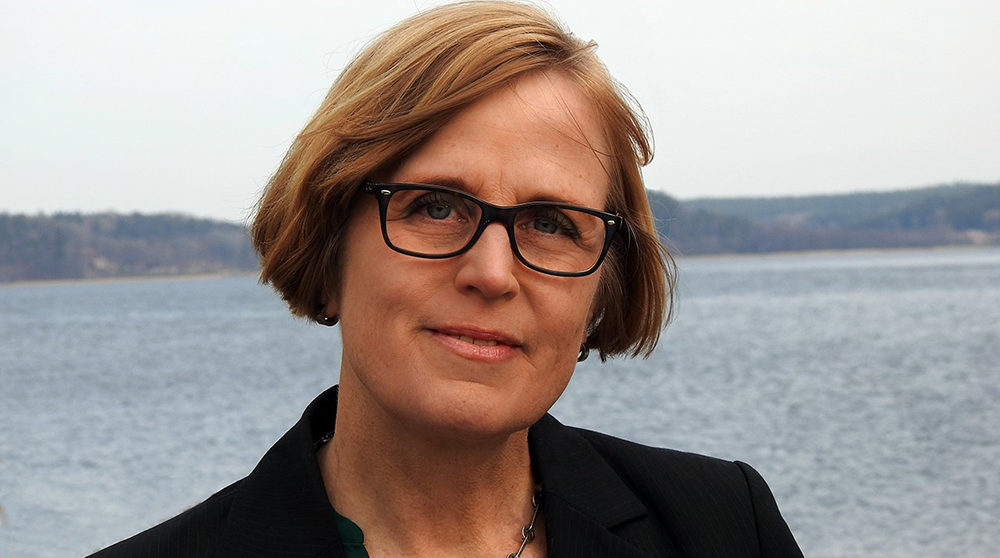The ignorance among Swedish editorial staff about the 1915 genocide against Christians in the Ottoman Empire (often referred to as Seyfo) is as dangerous as the fact that the Swedish Ministry of Foreign Affairs might consider cancelling a memorial service to appease Turkey, writes Nuri Kino, journalist and founder of A Demand for Action.
The opinions expressed in this article are those of the writer.
The Swedish Parliament might cancel the commemoration of the genocide of Christians in the Ottoman Empire 1915. That was revealed by freelance journalist Rasmus Canbäck in the Swedish daily newspaper Göteborgsposten last week.
The 24th of April every year Armenians, Assyrians/Chaldeans/Syriacs and Greeks commemorate the beginning of the genocide, the day that authorities of the Ottoman Empire rounded up and murdered hundreds of Armenian community leaders in today’s Istanbul (then known as Constantinople).
In my opinion, the way the news broke regarding Rasmus Canbäck’s scoop and how it was covered in the Swedish media overshadowed the discussion about whether the Swedish Ministry of Foreign Affairs wanted to cancel the yearly commemoration. It does not surprise me in the least that the Foreign Ministry might consider canceling this during ongoing NATO negotiations.
After all, Turkey, an important NATO member, continues to maintain its official denial despite irrefutable evidence that a genocide did take place. Even though scholars have determined that the Ottoman Empire’s atrocities – in parts of what is Turkey today – against its indigenous people during World War I met all of the criteria of the UN Genocide Convention and proves that the aim was to exterminate entire ethnic groups.
One of my first productions as a journalist involved being one of the producers and directors of the documentary ”The Cry Unheard”. That was back in 1999. The other producer was journalist and TV host Yawsef Beth Turo. My role was to be the devil’s advocate, I was to argue that no genocide had occurred until it could be proven. It’s only two decades ago and the genocide was virtually unknown. There was not a word about it in the history books of schools in countries like Sweden, and the narrative was pretty much that those who claimed that it happened only were mean people who wanted to negatively affect Turkey.
On top of that, my and others’ grandparents had hidden it from us. During the production of ”The Cry Unheard” we learned that they did so to prevent us from inheriting the barbarity they witnessed and the trauma it caused them.
I used to believe that I had a stomach of steel and could take anything. Refugee children will understand, I mean those who also have experienced drama and trauma leaving their native countries. I thought I was such a child and that, as an adult, I would have even thicker skin. But I woke up to their voices – all the ones we interviewed and I could not help but visualize and relive their experiences in my mind.
Ammo (uncle) Georgo contacted us himself to interview him. He was finally ready to, for the first time ever, share what he had been through as the sole survivor of a massacred family. As we sat down for the interview, a noticeable tremble took over his body and his eyes could not focus as he described how he was forced to watch his mother was beaten to the ground and then raped by several men. He himself was mutilated to the point of appearing dead to the perpetrators, and he was left in a pile of corpses of his family. He miraculously survived.
*Hilto (aunt) Feride told us how she was driven away from her family shouting ”mummy, mummy”, in a tumult of people running while bullets were in the air. A man embraced her and ran while trying to avoid the shells. That stranger saved her life. Many others were also saved that way. Hilto Feride later on found out that her parents, siblings, aunts, uncles, and cousins, as well as most of her tribe members, were all massacred.
Hearing about their experiences sent me straight to the emergency room at Södertälje Hospital, south of the capital Sweden. In Södertälje 40 percent of the inhabitants are Assyrians/Chaldeans/Syriacs or Armenians. I was diagnosed with something that could develop into a stomach ulcer and could be due to tremendous stress.
In retrospect, I believe that what made me sick was that everywhere we turned – museums, libraries, newspaper archives, communications at the Ministry of Foreign Affairs from that time period – the abuses were clearly documented. The general indifference, despite all the proof, was what hurt the most, namely, that the genocide had occurred and that noone had bothered to say or do anything about it.
Six years later, I returned to my hometown of Midyat in southeast Turkey, northern Bethnahrin (Mesopotamia). I was hired to film a new documentary for SVT, Swedish national public tv. Someone whispered in my ears that evidence of the genocide of 1915 was being erased in one of the nearby villages. A mass grave was discovered, and the skeletons were being stuffed in garbage bags. I went there, concealed myself, and photographed the excavations. This particular grave’s connection to the genocide in 1915 has never been confirmed. However, survivors clearly identified this location as one of the locations of a big massacre.
According to the locals, one of the other villages I visited has a hero’s tomb. There are no inscriptions on the small gravestone. To make a long story short, it wasn’t until years later that I discovered the grave belonged to my direct ancestor, my grandmother’s father, Shae Gunduro-Kino. He was one of the hidden heroes of our MalkeMire tribe. Mainly thanks to this discovery I was able to locate relatives in Syria, Germany, Sweden, and Holland. I found the grandchildren of my grandmother’s two surviving sisters.
Grandma Meyyo (Meryem) was discovered alive in the same well from which I would later drink water as a child. Her entire family was murdered and dumped into it. At least we thought so before we found out about the two surviving sisters. Apparently, one of the perpetrators heard the voice of a child, found and pulled my grandmother out of the well. He took her away to be raised as his daughter. Years later, when she was a teenager, a Kurdish friend of her family helped her escape back to Midyat. Her sisters, who she didn’t know were alive, were saved pretty much in the same way. Hilto Feride and surviving strangers took them with them to Enhil, a nearby village where Assyrians/Syriacs were saved because it’s on a hill and could be defended.
Shae Gunduro-Kino was working as an engineer in Bulgaria when the genocide began. He quickly traveled to Midyat to try to save his family. Once there, he had to make a choice: save his family from being slaughtered or save thousands of Assyrians/Syriacs from being eliminated in the village of Aynward. They were running out of ammunition, and the Turkish army along with its Kurdish allies were getting closer by the hour. He made his way there through tunnels connected to an underground city that made headlines around the world after it was discovered last year. He chose the path that would save the most people. He asked women to collect all of the metal and men to assist him in creating templates from which they made bullets. He also directed them to gather materials for the production of gunpowder. It is said that his leadership contributed to saving the lives of the majority of those who fled to the village of Aynward. Sadly, he did not survive.
I’m not sure if Shae or Meyyo guided my subconscious or if they somehow spiritually helped with this journalistic endeavor to draw attention to and inform about the genocide, but what I do know is that the facts must be highlighted, and genocides must never be forgotten lest they be repeated. In 2014, ISIS stated its intention to complete the 1915 genocide by exterminating Christians, Yezidis, other indigenous peoples, and moderate Muslims.
During the same year as ISIS started its campaign, friends I found on social media and I started the A Demand For Action campaign. We wanted to alert the world of an impending genocide. We did not succeed in stopping it completely, but we and others eventually convinced President Obama, the United States, and its allies to put an end to most of it. We then went on to contribute to President Biden’s recognition of the genocide of 1915. If history books had contained information about what my grandmother endured 1915, the ISIS genocide maybe would have been prevented and repeated.
On Wednesday, April 19, five days before April 24, the annual memorial day for the genocide, a debate in both social and traditional media gained ground in Sweden. As I stated above Rasmus Canbäck had sources claiming the Swedish Ministry of Foreign Affairs had wanted to cancel the memorial service that has been held in the Riksdag (the Swedish parliament) since 2010. They did not want it to affect Sweden’s NATO application.
But the Swedish newspaper Göteborgsposten only mentioned Armenians while grouping everyone else affected by the genocide as ”other minorities.” To decimate them in this way, unknowingly or knowingly, is perpetuating the abuse that would end up causing these indigenous people to be forgotten. Now, I don’t mean that this was Göteborgsposten’s intention, but it would be appropriate to correct this.
Canbäck replied to me on Twitter that he did indeed mention all ethnic groups by their ethnic names, but that the editor must have deleted them.
It got even worse in the afternoon when Sveriges Radio’s (Swedish Public Radio) flagship Studio Ett, was to debate the possible cancellation of the commemoration day in the Riksdagen. The presenters and the reporter made no mention of anyone other than Armenians. This despite the fact that one of the Riksdag members, Håkan Svenneling, at least as it appeared, had attempted to correct them and mentioned Greeks and Assyrians/Chaldeans/Syriacs.
It is time for editors and reporters to educate themselves. Not mentioning indigenous people that were marked for eradication is very harmful during discussions of genocide. If the editors don’t have the know-how, in Sweden or any other country of the western world, pick up the phone and call us. There are plenty of people who can provide you with facts and help you with things you might not have the right expertise regarding.
*Interviews with Hilto Feride and others that were conducted in 1999 were recently used in a documentary with the title ”Souls in Transit”. The film qualified for the Oscars.
Nuri Kino
Nuri Kino is an independent investigative multi-award-winning reporter, filmmaker, author, Middle East and minority rights expert. He is also the founder of A Demand for Action.
Read more


